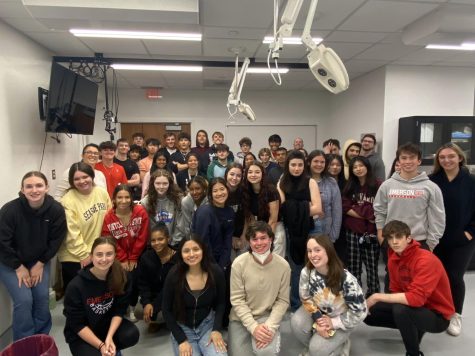Life After Death: Functional Human Anatomy Lab at Rutgers
June 11, 2023
A corpse lays in the middle of a room, unclothed and non-responding. Dozens of people circle around, but no one is fearful. No one calls for help. In fact, everyone studies the body carefully.

This is not a crime scene; this is an anatomy field trip.
This is the second year Ms. Corso has taken her anatomy classes to the Functional Human Anatomy Lab at the New Brunswick Campus of Rutgers University to view the semester-old cadavers.
“The purpose of the trip is to actually get a hands-on feel for everything that we’ve learned in class and actually experience what the human body is made out of, how it functions, and how it works,” said Corso. “I really do enjoy seeing the students’ reactions and hearing them ask the professor questions that really interest them.”
Anatomy and AP Biology students watched as Adam Divine, a professor at Rutgers, closely analyzed and talked through the anatomy and physiology of the two cadavers: one a female and the other a male. Both had died of natural causes.
Students at Rutgers spend the semester dissecting the cadavers, studying the many layers, organs, and systems that make up the human body. Once the semester is up, the cadavers are either returned to their families for a proper burial or cremated and kept on Rutger’s property.
“I would like to pursue a career in the medical field so taking anatomy will be very useful in my future,” said student Jennifer Asitimbay. “This trip also confirmed that I would 100% like to pursue a career in the medical field. I was truly fascinated with seeing the human brain, heart, lungs, and liver and I wasn’t grossed out!”
It was truly an eye-opening experience for the students as they applied everything they learned this year to an actual human body. Many students like Jennifer confirmed their wanting to pursue a career in the medical field after high school.
While the average person would faint at the sight of a cadaver, Corso’s anatomy students were up for the experience.
“At first, they were shocked and a little nervous, but eventually they fully embrace the experience and get into it,” responds Corso.
“I did not like the smell at first but I eventually got used to it,” said Asitimbay. Contrary to popular belief, the smell of the preserving solution is one of the more typical causes of nausea and queasiness on the trip.
Wishing you could have gone on this trip? No worries! Corso hopes to give classes in the years to come
the same experience.





